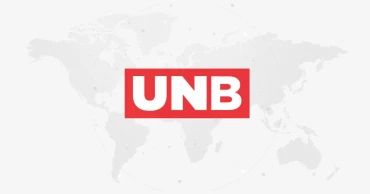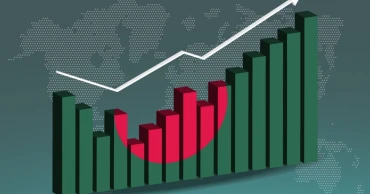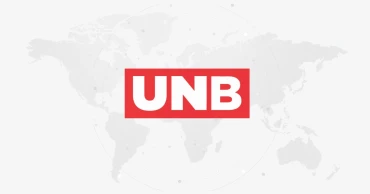GDP growth rate
Bangladesh Budget 2023-24 passed in parliament
The parliament passed the Tk 7,61,785 crore national budget for FY 2023-24 -- with the goal of achieving 7.5 percent GDP growth rate and keeping annual inflation at around 6 percent.
Finance Minister AHM Mustafa Kamal moved the Appropriations Bill 2023, seeking a budgetary allocation of Tk 11,10,840 crore which was passed by voice votes.
READ: Budget will help to build Smart Bangladesh: Speakers
Earlier today, the parliament passed the Finance Bill 2023 with some changes.
Following the proposal mooted in the House by the Finance Ministry for the parliamentary approval of the appropriation of funds for meeting necessary development and non-development expenditures of the government, the ministers concerned placed justifications for the expenditure by their respective ministries through 59 demands for grants.
READ: Proposed budget for FY 2023-24 fails to address macroeconomic challenges, says CPD
Earlier, the parliament rejected, by voice votes, a total of only 503 cut-motions that stood in the name of opposition members on 59 demands for grants for different ministries.
A total of 10 MPs, including from Jatiya Party and Gono Forum, submitted their cut-motions on the budget. They are: Kazi Firoze Rashid, Rustam Ali Farazi, Mujibul Huq, Fakhrul Imam, Pir Fazlur Rahman, Shamim Haider Patwari, Begum Rawshan Ara Mannan, Hafiz Uddin Ahmed, Mokabbir Khan, and Rezaul Karim Bablu.
READ: It’s anti-people designed to plunder national wealth: BNP on National Budget for FY24
They were, however, allowed to participate in the discussion on Commerce Ministry and Health Services Division.
Later, Speaker Dr Shirin Sharmin Chaudhury quickened the process of passing the demands for grants for different ministries without giving a lunch break.
Opposition and independent MPs were present in the House when the Appropriation Bill was passed, and they did not raise objection to passing the bill.
READ: Supplementary budget for outgoing fiscal passed in JS
Finance Minister AHM Mustafa Kamal on June 1 placed a Tk 7,61,785 crore budget for Bangladesh for FY 2023–24, which is 15.2 percent of the GDP, with a philosophy of ensuring a hunger- and poverty-free, knowledge-based, and 'Smart Bangladesh' by 2041.
7.5% GDP growth rate with an expectation of keeping annual inflation at around 6%
The allocation for operating and other sectors is Tk 4,36,247 crore, while Tk 2,63,000 crore will go to the Annual Development Programme.
The total revenue is estimated at Tk 5 lakh crore. Out of this, Tk 4,30,000 crore will be collected by the National Board of Revenue and Tk 70,000 crore from other sources.
Read more: Unrealistic budget won’t help overcome economic crisis: Fakhrul
The overall deficit in the proposed budget for FY 2023-24 will stand at Tk 2,61,785 crore, which is 5.2 percent of GDP. Out of the total deficit, Tk 1,55,395 crore will be financed from domestic sources and Tk 1,02,490 crore from external sources.
2 years ago
Bangladesh’s GDP growth rate will overtake China’s in current fiscal year, IMF predicts
The latest report of the Internal Monetary Fund (IMF) on Asia-Pacific region forecasts that Bangladesh's GDP growth rate in the current fiscal year will overtake that of China.
The report also predicts that Bangladesh will be in second place, after Vietnam, in terms of GDP growth rate in Asia-Pacific in the next fiscal year.
According to the IMF's Regional Economic Outlook for Asia and Pacific May 2023 report, Bangladesh is expected to surpass both China and India in terms of growth in 2024.
In Bangladesh, GDP growth rate will slow down to 5.5 percent in 2023 because of demand-management measures, which is still higher than China's projected growth rate of 5.2 percent.
Read more: Bangladesh's GDP growth expected to pick up to 6.2% in FY2024: World Bank
But the economy of China is much bigger than that of Bangladesh.
The IMF report suggests that the recently approved Extended Fund Facility for Bangladesh will help address economic challenges caused by Russia's war in Ukraine, and the Resilience and Sustainability Facility arrangement will expand fiscal space to finance climate investment priorities and build resilience against long-term climate risks.
The report highlights the importance of international cooperation, particularly in securing financial assistance for climate change adaptation in vulnerable emerging markets in the region, including Bangladesh and the Pacific Islands.
Read More: Govt struggles to lift tax-GDP ratio to double digits
2 years ago
Bangladesh's GDP growth expected to pick up to 6.2% in FY2024: World Bank
Bangladesh made a rapid recovery from the Covid-19 pandemic, supported by prudent macroeconomic policies, but the economy now faces considerable challenges with global uncertainty, rising inflationary pressure, energy shortage, a balance-of-payments deficit, and a revenue shortfall, says the World Bank in its half yearly update released today (April 04, 2023).
The Bangladesh Development Update April 2023, entitled “Trade Reform: An Urgent Agenda”, says that accelerating the implementation of structural reforms, including trade reforms and export diversification, will help Bangladesh navigate the current challenges and sustain growth momentum.
Growth in Bangladesh is expected to accelerate over the medium term, as inflationary pressure eases, external conditions improve, and reform implementation gains momentum. Real GDP growth is expected to decelerate to 5.2 percent in FY2023 due to rising inflation, tighter financial conditions, disruptive import restrictions, and global economic uncertainty. In FY2024, growth is expected to pick up to 6.2 percent.
Read More: ADB lowers Bangladesh’s GDP growth forecast to 5.3% in FY 23
“Russia’s invasion of Ukraine and global uncertainty have impacted countries around the globe. Bangladesh’s post-pandemic recovery has been disrupted by elevated commodity prices, rising interest rates, and slowing global growth,” said Abdoulaye Seck, World Bank Country Director for Bangladesh and Bhutan. “The World Bank stands ready to support Bangladesh with reforms to accelerate growth and strengthen resilience.”
Higher commodity prices have contributed to inflationary pressure. The balance-of-payments deficit reached $7.2 billion in the first half of FY2023, up from $5.3 billion in FY2022, creating considerable pressure on foreign exchange reserves. A multiple exchange rate system has contributed to the balance of payments pressure, disincentivizing export and remittance inflows. Moving towards a single market-based exchange rate will help restore external balance.
Risks to the outlook remain elevated. Domestic banks faced challenges with tighter liquidity and increasing non-performing loans. The fiscal deficit widened in FY2023, with higher financing from domestic banks. However, the January 2023 joint World Bank-IMF Debt Sustainability Analysis (DSA) assessed that Bangladesh remained at low risk of debt distress.
Read More: Expand tax net and integrate digital system to enhance tax-GDP ratio, ICAB urges NBR in budget proposal
Improving trade competitiveness for export diversification will be critical to achieving Bangladesh’s aspiration of upper middle-income status by 2031.
“The ready-made garments sector accounts for about 83 percent of Bangladesh’s exports. The Covid-19 pandemic underscored the risk of overreliance on a single sector,” said Bernard Haven, World Bank Senior Economist and co-author of the report. “Diversifying exports and improving competitiveness will help Bangladesh achieve upper-middle income status by 2031. For this, it will be important for Bangladesh to reduce both tariff and non-tariff barriers. A comprehensive reform program can strengthen regional integration, particularly with South Asia and Southeast Asia.”
The Bangladesh Development Update is a companion piece to the South Asia Economic Focus, a twice-a-year World Bank report that examines economic developments and prospects in the South Asia region and analyzes policy challenges faced by countries. The Spring 2023 edition, titled “Expanding Opportunities: Toward Inclusive Growth”, launched on April 4, 2023, shows that South Asia’s growth prospects have weakened due to tightening financial conditions, with large downside risks in most countries given limited fiscal space and depleting reserves. It also analyzes the high level of inequality of opportunity in the region and offers recommendations to achieve more equitable and inclusive growth.
Read More: Govt struggles to lift tax-GDP ratio to double digits
2 years ago
Bangladesh made spectacular economic progress despite limited resources: ICCB
Bangladesh has made spectacular economic progress over the last five decades despite limited resources, International Chamber of Commerce, Bangladesh (ICCB) President Mahbubur Rahman said Sunday.
"The GDP growth rate has reached a record high. Per capita income has also risen steadily," he said.
Read:Dhaka conveys protests to UK over human rights report
Rahman made the remarks while presenting the Executive Board Report of ICC Bangladesh for 2020 in its annual council held virtually in the city.
He said the country has achieved near self-sufficiency in food production for its population of 170 million.
"The country now even shoulders the burden of the world's largest refugee population of over 1 million Rohingyas who have fled persecution in neighbouring Myanmar," Rahman said.
ICCB President noted that Covid-19 has created not only a global economic crisis but the loss of millions of lives globally. "This has led to steep recessions in many countries. It has also had devastating effects on women, the young, the poor, people employed informally, and those working in contact-intensive sectors."
However, Bangladesh, which weathered the pandemic better than most economies in the sub-region, will continue to grow strongly as exports pick up.
Also read: Bangladesh urges IORA member states enhance economic cooperation
In Bangladesh, according to experts, not everyone has benefited equally from the nation's impressive growth and development because of rising income and wealth inequality, said the ICCB.
Another challenge is the heavy concentration of economic activity in big cities like Dhaka and Chattogram, resulting in a huge rural-urban divide and increased urban poverty, it said.
Referring to a recent study, the Executive Board Report mentioned that a staggering 96% of micro, small and medium enterprises (MSMEs) in Bangladesh lost income during the Covid-19 pandemic.
MSMEs in the country reported a median loss in business of 82% during the "national holidays" and customer footfall reduced by an average of 67%.
The recent upsurge of pandemic waves in India, which started in March 2021, has caused unprecedented and alarming infection and death.
The Indian virus has also spread in neighbouring countries including Bangladesh as well as the UK. Unfortunately, vaccine producing countries are reluctant to allow the production of vaccines in other countries, said ICCB.
Also read: Working to ensure economic solvency of people at grassroots: PM
Among others, ICC Bangladesh vice-presidents Rokia A Rahman and AK Azad; Syed Manzur Elahi, chairman, of Apex Footwear Ltd; Md Jashim Uddin, president, Federation of Bangladesh Chambers of Commerce & Industry (FBCCI); Rizwan Rahman, president, Dhaka Chamber of Commerce & Industry (DCCI), Mahbubul Alam, president, Chittagong Chamber of Commerce & Industry (CCCI); Rupali Chowdhury, president, Foreign Investors’ Chamber of Commerce & Industry (FICCI); Sheikh Kabir Hossain, president, Bangladesh Insurance Association (BIA); Faruque Hassan, president, Bangladesh Garment Manufacturers & Exporters Association (BGMEA); Mohammad Ali Khokon, president, Bangladesh Textile Mills Association (BTMA); Mohammad Hatem, first vice-president, Bangladesh Knitwear Manufacturers & Exporters Association (BKMEA), ICCB executive board members Abdul Hai Sarker, Aftab ul Islam, Kutubuddin Ahmed; Md Fazlul Hoque, Mir Nasir Hossain and Simeen Rahman; Muhammad A (Rumee) Ali, chairman, ICC Banking Commission and CEO, Bangladesh International Arbitration Centre (BIAC); ICCB members Mohammad Fazlul Azim, managing director, Azim Group; Md Mahbub Ur Rahman, CEO, The Hongkong and Shanghai Banking Corporation (HSBC) Ltd; Syed Waseque Md Ali, managing director, First Security Islami Bank Ltd; Syed Mahbubur Rahman, managing director & CEO; Mutual Trust Bank Ltd; Mohammad Shamsul Islam, managing director, National Housing Finance and Investments Limited; Tanvir Ahmed, managing director & CEO, Sheltech Ceramics Ltd.; Rubaiyat Jamil, managing director, ICE Technology; Md Abdul Jabbar, managing director, DBL Group; Dr Rubana Huq, managing director, The Mohammadi Limited; Tahrin Aman, president, Nordic Chamber of Commerce and Industry (NCCI); Anis A Khan, advisor to the board, Tyser Risk Management Bangladesh Limited (TRMBL); Mohd Arshad Ali, managing director, The Merchants Limited; Asif Ibrahim, vice-chairman, Newage Textiles Ltd; R Maksud Khan, chairman, Bengal Fine Ceramics Limited; Syed Ali Jowher Rizvi, managing director, Summit Alliance Port Limited; Md Abdul Jabbar, managing director, DBL Group; K A M Majedur Rahman, CEO, AK Khan & Company Ltd, Ataur Rahman, secretary general, ICC Bangladesh & Shamim Ahmed, deputy managing director, Mercantile Bank Ltd attended the meeting.
4 years ago
Will implement budget, prove criticisms useless: Minister
Information Minister Dr Hasan Mahmud on Friday said that this year's budget will be implemented, proving that all criticisms are useless.
5 years ago




.jpg)


